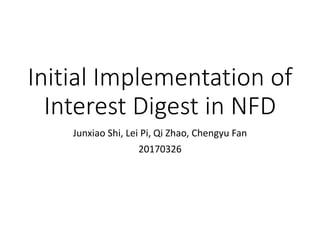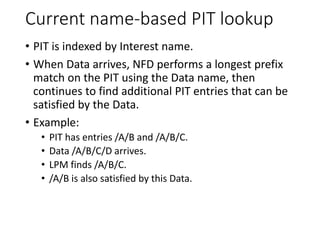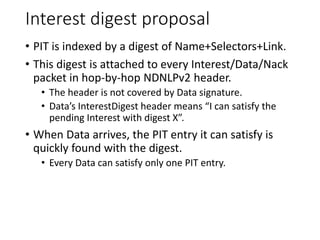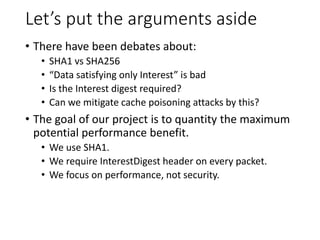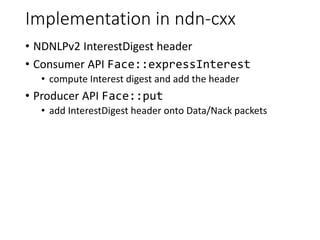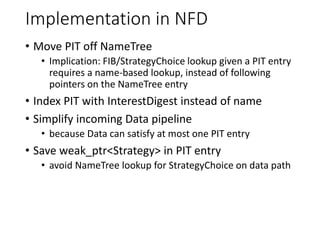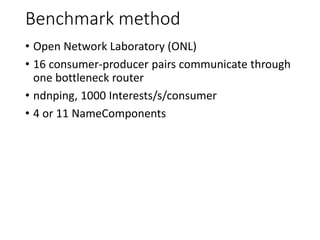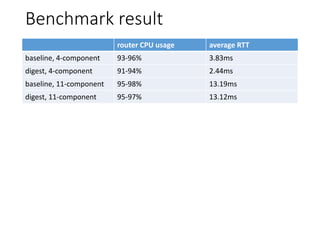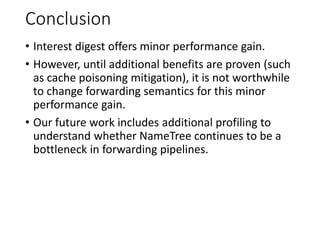NFD InterestDigest
- 1. Initial Implementation of Interest Digest in NFD Junxiao Shi, Lei Pi, Qi Zhao, Chengyu Fan 20170326
- 2. Current name-based PIT lookup âĒ PIT is indexed by Interest name. âĒ When Data arrives, NFD performs a longest prefix match on the PIT using the Data name, then continues to find additional PIT entries that can be satisfied by the Data. âĒ Example: âĒ PIT has entries /A/B and /A/B/C. âĒ Data /A/B/C/D arrives. âĒ LPM finds /A/B/C. âĒ /A/B is also satisfied by this Data.
- 3. Interest digest proposal âĒ PIT is indexed by a digest of Name+Selectors+Link. âĒ This digest is attached to every Interest/Data/Nack packet in hop-by-hop NDNLPv2 header. âĒ The header is not covered by Data signature. âĒ Dataâs InterestDigest header means âI can satisfy the pending Interest with digest Xâ. âĒ When Data arrives, the PIT entry it can satisfy is quickly found with the digest. âĒ Every Data can satisfy only one PIT entry.
- 4. Letâs put the arguments aside âĒ There have been debates about: âĒ SHA1 vs SHA256 âĒ âData satisfying only Interestâ is bad âĒ Is the Interest digest required? âĒ Can we mitigate cache poisoning attacks by this? âĒ The goal of our project is to quantity the maximum potential performance benefit. âĒ We use SHA1. âĒ We require InterestDigest header on every packet. âĒ We focus on performance, not security.
- 5. Implementation in ndn-cxx âĒ NDNLPv2 InterestDigest header âĒ Consumer API Face::expressInterest âĒ compute Interest digest and add the header âĒ Producer API Face::put âĒ add InterestDigest header onto Data/Nack packets
- 6. Implementation in NFD âĒ Move PIT off NameTree âĒ Implication: FIB/StrategyChoice lookup given a PIT entry requires a name-based lookup, instead of following pointers on the NameTree entry âĒ Index PIT with InterestDigest instead of name âĒ Simplify incoming Data pipeline âĒ because Data can satisfy at most one PIT entry âĒ Save weak_ptr<Strategy> in PIT entry âĒ avoid NameTree lookup for StrategyChoice on data path
- 7. Benchmark method âĒ Open Network Laboratory (ONL) âĒ 16 consumer-producer pairs communicate through one bottleneck router âĒ ndnping, 1000 Interests/s/consumer âĒ 4 or 11 NameComponents
- 8. Benchmark result router CPU usage average RTT baseline, 4-component 93-96% 3.83ms digest, 4-component 91-94% 2.44ms baseline, 11-component 95-98% 13.19ms digest, 11-component 95-97% 13.12ms
- 9. Conclusion âĒ Interest digest offers minor performance gain. âĒ However, until additional benefits are proven (such as cache poisoning mitigation), it is not worthwhile to change forwarding semantics for this minor performance gain. âĒ Our future work includes additional profiling to understand whether NameTree continues to be a bottleneck in forwarding pipelines.

